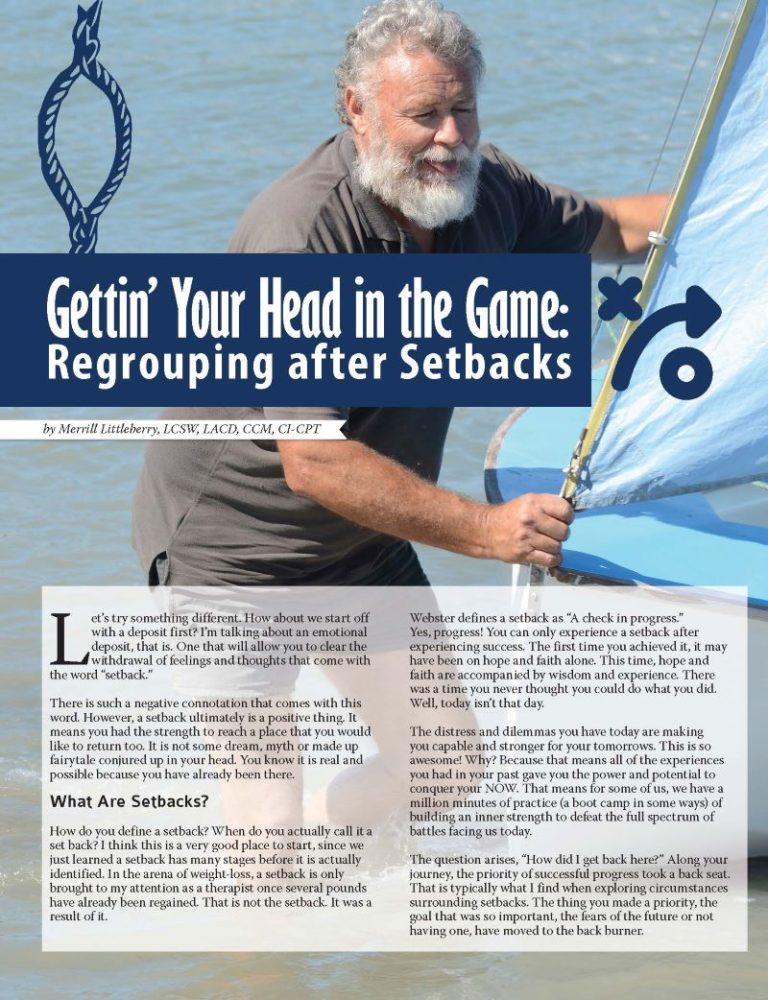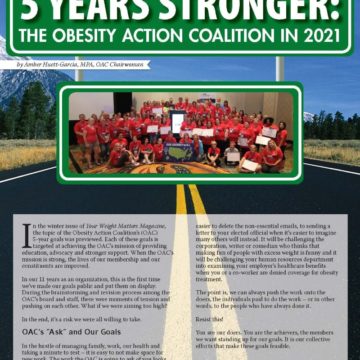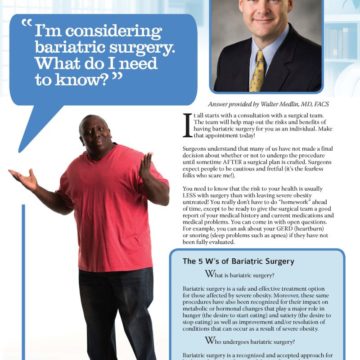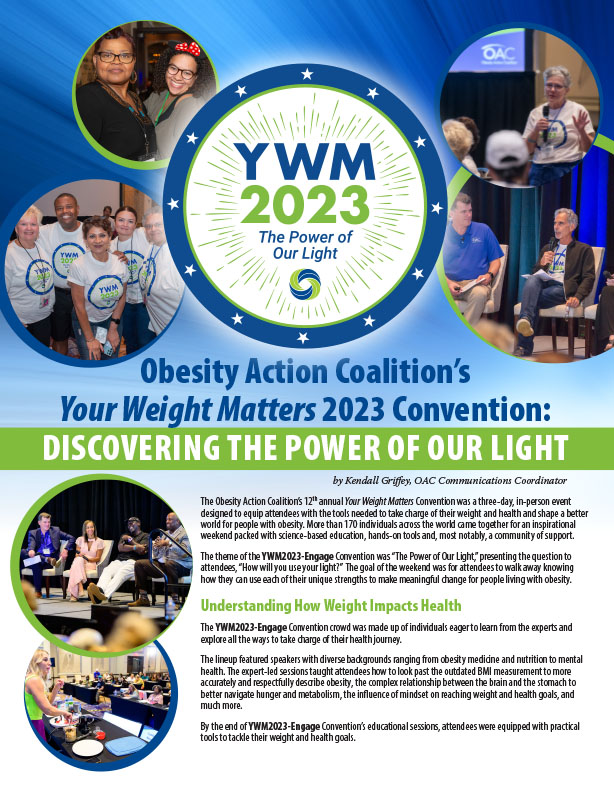Gettin’ Your Head in the Game: Regrouping after Setbacks


by Merrill Littleberry, LCSW, LACD, CCM, CI-CPT
Summer 2016
Let’s try something different. How about we start off with a deposit first? I’m talking about an emotional deposit, that is. One that will allow you to clear the withdrawal of feelings and thoughts that come with the word “setback.”
There is such a negative connotation that comes with this word. However, a setback ultimately is a positive thing. It means you had the strength to reach a place that you would like to return too. It is not some dream, myth or made up fairy tale conjured up in your head. You know it is real and possible because you have already been there.
What Are Setbacks?
How do you define a setback? When do you actually call it a set back? I think this is a very good place to start, since we just learned a setback has many stages before it is actually identified. In the arena of weight-loss, a setback is only brought to my attention as a therapist once several pounds have already been regained. That is not the setback. It was a result of it.
Webster defines a setback as “A check in progress.” Yes, progress! You can only experience a setback after experiencing success. The first time you achieved it, it may have been on hope and faith alone. This time, hope and faith are accompanied by wisdom and experience. There was a time you never thought you could do what you did. Well, today isn’t that day.
The distress and dilemmas you have today are making you capable and stronger for your tomorrows. This is so awesome! Why? Because that means all of the experiences you had in your past gave you the power and potential to conquer your NOW. That means for some of us, we have a million minutes of practice (a boot camp in some ways) of building an inner strength to defeat the full spectrum of battles facing us today.
The question arises, “How did I get back here?” Along your journey, the priority of successful progress took a back seat. That is typically what I find when exploring circumstances surrounding setbacks. The thing you made a priority, the goal that was so important, the fears of the future or not having one, have moved to the back burner.
Navigating the High Seas of Setbacks
When your priority structure gets rearranged, you become disengaged. You may say, “life happened.” Well, life is always happening. We must not let the heavy waters of the world sink our vessel when a storm blows in. The more you allow in, the harder it is to get it out — especially if you ignore the point of the entry where the crack began! It becomes the source of distraction weighing you down, leaving you feeling extremely guilty and overloaded.
The boat that sunk isn’t the setback! The setback instead was not addressing the negative thinking which began at the first sign of distress. Instead, the mistakes were compiled, allowing the issues to occupy, then dominate, your safe space. It was allowed to take priority over your progress. That small leak that you noticed, such as the soda you started sipping, the walk you stopped doing, the time you no longer take for yourself or those negative thoughts you started having throughout time, will cause your ship to sink. It won’t happen overnight but it will happen.
Look back at what created the crack. When do you first recall its appearance? You may feel you have been defeated, when truly you were merely distracted. So, what do we do now? Become mindful, interrupt and redirect. Oh, and gather lots of duct tape and buckets too!
There is typically a change factor, large or small, showing that something shifted. When facing setbacks, additional rationales are thrown in to the session such as, “Now, I have a longer commute to work… children’s activities… job stress… a break-up or a new relationship.” These rationales are misused as valid reasons to change your priority of a healthier, happier life. When these and many other classic life events occur, you stop doing what was working, and you start doing something that literally works against you.
Here’s a real life example from one of my patients: “Football season started and we are on-the-go all the time. It is much easier, since we don’t have time, just to stop and pick up something at the drive-through.” However, last year during football season, that same person was preparing and being proactive for the day, as opposed to being reactive. The same 24 hours in the day still exist, each hour still containing no less than 60 minutes. The situation didn’t change, the person’s priorities did.
Who Sunk My Battleship?
I cannot count how many times a patient starts a session saying, “I don’t know why I am having setbacks or back-sliding.” Some get stuck in the same rut, and others process through it. You can begin to move forward, actually living life again, as opposed to life living you. Look at where your map leads you. Is this where you want to go?
If not, I suggest you quickly change your course. Is it possible you are suffocating in the clutter of excess emotional F.A.T. (Falsely Acquired Thoughts), and it’s preventing you from staying the course? F.A.T. is toxic and it has impeccable timing. It punches you right in the gut, just when you thought you were on the up-side of down. Unfortunately, you may have learned to be a collector of these harmful ideas, hoarding them throughout the years, until it feels like there is no room to stand. Continuing to say negative things to yourself when nobody’s listening. Continuing to do negative things when nobody’s watching, always hoping no one will find out. These are examples of practice gone bad or “practice gone pain” as I like to say!
I have heard many people say, “It was like a drug. It was an incredible high, only to be followed by unmeasurable shame and self-hate.” Drugs, sex, food, abuse, spending… the choice might be different, but the destruction of the human mind is still the same. What makes you continually refuel that source of pain?
This behavior provides unlimited energy to the frustration and disgusting feelings that you are trying desperately to fight off and avoid. One can carry this F.A.T. around, allowing it to weigh you down and create a lethal environment inside and out. Once again, not allowing you to float your boat. This is physically and emotionally toxic to you and everyone around you.
Now, I hope that does NOT sound appeasing, pleasurable or sustainable. If it does, you have learned how to function in dysfunction. Which means you feed off the pain of others or your own. It is done just to feel something, instead of nothing. This has become so familiar, and you can’t imagine your life without it.
This is where reading an article stops and seeking out individual therapy is needed. There are many types of dysfunction used to mask emotional pain and emptiness. Examples include unsafe sexual or promiscuous acts, using not-prescribed or illegal drugs to deaden life’s pains. Another example can be over-filling your body with excessive food that it cannot effectively use, just to distract from the hollow feeling of emotional bankruptcy. Some will go into debt by spending what they don’t have to make others believe they are someone they don’t even want to be. Another common dysfunction is hurting those around you by inflicting unnecessary pain because you never dealt with your own damage.
It stems from not feeling lovable, not worthy and not a priority. That changes now! You can’t always go back and undo the harm caused to others or yourself, but you can make the choice not to do it again. If you don’t have the ability right now to help yourself, just don’t continue to hinder, hurt or cause self-harm. These are two completely different things. For example, not everyone in your life can help you but it sure would be great if they stopped hurting you, correct? Well, don’t be one of them.
Why do these behaviors fill our lives? Typically it’s because you’re “empty.” The same thoughts that made you happy, proud and successful have now turned into feelings of selfishness and guilt. Tell yourself: “I’m making myself a priority. I am important. I matter too.”
How can we let what we need for survival be interpreted as selfishness? The better, the happier and the healthier you are, the more you and the world around you thrives. The development and renewing of self-love is an absolute necessity in reaching and sustaining what you value. Not valuing the importance of your being will make you feel lesser, which in turn makes you do less, for you.
Loving yourself is the foundation to achieving long-term success instead of short-term change. When you learn to appreciate who you are and what you have, your perception changes. Only then will you cherish the harmony necessary to sustain inner balance.
Get Your Head Back in the Game
You’ve never really been out of the game, you just started paying more attention to the forces around you than the power within you. To score again in this game, you need to remember what you practiced that made you feel like you could be victorious. Re-evaluate by asking yourself the following:
- What is my vision, desire and capacity?
- Vision: See where you want to be.
- Desire: Inquire within as to your why.
- Capacity: Increase your knowledge through skill building, and enhancing tenacity.
- Get it, Got it, Good!
So what needs to change? Maybe it’s nothing. The word “change” seems so difficult and daunting. So, how about an upgrade! Now that word has a positive connotation. In most cases an upgrade is a great thing! You’re due for a full upgrade, one that will require a reboot. Apply an improved method to your ordinarily routine. Will it work? Well, how important is it to you?
I have yet to see anybody downgrade their cell phone for the older version just because of its difficulty to learn or due to the amount of time necessary to master the new device. Something keeps us trying, mistake after mistake. We make it a priority. It is so important to us that we keep on trying until we don’t even realize when it’s just something we do. So many times patients will ask, “When will this feel normal?” When you stop thinking it’s abnormal. None of you out there think you have an abnormal cell phone unless you just purchased it. You know in your head, “I just haven’t figured it out, yet.”
Conclusion
I ask that you be mindful and examine your distribution of energy. Where and when did you redirect your distribution of emotional kilowatts? Remember, you are just going through it, don’t own it. You have the choice: continue consuming your “feeling bad energy,” or use that same energy to be free. If for whatever reason after the storm has passed, if you still have a little water in your boat, use it “to feed the weeds or feed the flowers. Whichever one you choose, that’s what you will grow.”
About the Author:
Merrill Littleberry, LCSW, LACD, CCM, CI-CPT, aka Vitamin M as many know her, is a motivator and healthcare professional specializing in the area of mental, emotional and physical well-being through balance. As a motivational speaker, psychotherapist, personal trainer, friend, mother and many other assorted roles she lives, one thing always remains the same in her world She believes mental and physical health are equally important, stating that “One cannot function optimally without the other.” As a dedicated advocate striving to improve the lives of others, her hopes and aspirations are ongoing to continually discover new ways to motivate and impact the futures of others. Her true passion in life is to help ignite the uninspired, to create new motivators and to stimulate society by transforming lives to be all they were designed to become. As Vitamin M says often, “Each evening, ask yourself, did you excel at your capacity?”
by Robyn Pashby, PhD Winter 2024 “No one is ever going to date you if you don’t…
Read Articleby Kendall Griffey, OAC Communications Coordinator Winter 2024 The Obesity Action Coalition’s 12th annual Your Weight Matters…
Read Articleby Nina Crowley, PhD, RD (with Inspiration from Shawn Cochran) Winter 2024 Dating, no matter your age,…
Read Article









